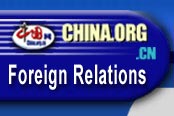As Li Peng, chairman of the Standing Committee of the National People's Congress, China's top legislature, wrapped up his week-long official goodwill visit to India on Wednesday, diplomatic observers called this visit a "journey for understanding, friendship and cooperation" and a "complete success."
As one of the first major visits by Chinese leaders to neighboring countries in the opening year of the new millennium, Li's visit has attained its preset goal of increasing understanding and friendship between Beijing and New Delhi and will surely play a major role in propelling the building of a constructive cooperative partnership between the two countries in the 21st century, diplomatic sources noted.
With this visit, China and India have also maintained a fine momentum in high-level exchange of visits, highlighted by Chinese President Jiang Zemin's 1996 visit to India and last year's visit to China by Indian President K.R. Narayanan, they added.
During his visit from January 9 to 17, Li called on President Narayanan and held talks with Indian Prime Minister Atal Bihari Vajpayee. He also met Indian Vice President and Chairman of Rajya Sabha, or the upper house of the Indian parliament, Krishan Kant and held talks with Speaker of Lok Sabha, the lower house of parliament, G.M.C. Balayogi, who had jointly invited Li for the visit.
Li also had meetings with Indian External Affairs Minister Jaswant Singh, Opposition Leader and National Congress Party President Sonia Gandhi and various parliamentary party leaders.
His other diplomatic maneuvers included participation in a reception hosted by Najma Heptulla, deputy chairman of Rajya Sabha and president of the council of the Inter-Parliamentary Union, a public speech on Sino-Indian friendship and cooperation and interviews with India's state television station Doordarshan TV and major newspaper the Hindu.
A clear message from both sides during the talks and meetings was that China and India had no reason not to co-exist in peace and harmony, and that the two largest developing nations in the world should enhance exchange and cooperation in various fields, diplomatic sources in New Delhi noted.
While Li stressed on many occasions that China and India had more similarities and identical views than differences and problems, Vajpayee agreed that cooperation between the two countries would give the developing world a louder voice in international forums such as the World Trade Organization.
Li told the Indian leaders that China and India not only faced the common challenge of developing domestic economy and improving people's living standards, but also shared many common grounds on how to safeguard world peace and establish a just and fair new international political and economic order.
Li reiterated that China always attached great importance to its relations with India and cherished its traditional friendship with India. China never viewed India as a threat to it and also had no intention to become a threat to any other nation itself, Li stressed.
Both sides agreed that the existing differences and problems should be well resolved through negotiations. While Indian leaders expressed the hope that negotiations on the border issue should be accelerated, Li conveyed the Chinese stand that neither the border issue nor any other problems should stand in the way of the development of bilateral relations and growing friendly ties would create an atmosphere more conducive to the final resolution of these problems.
In order to strengthen parliamentary contacts and cooperation, Li raised a three-point proposal which included increase of personnel exchanges between the two parliaments, the establishment of a Sino-Indian Parliamentary Friendship Group and closer cooperation between the two parliaments in international affairs.
The Indian side made immediate and positive response to Li's proposal, as all Indian parliamentary party leaders agreed that the development of Sino-Indian relationship was in the interest of both nations. Many Indian parliamentary members also conveyed the wish to visit China as early as possible.
During a meeting with representatives from the Indian industrial and commercial circle, Li noted that the Chinese and Indian economies had some kind of complementarity and therefore trade and economic cooperation between the two countries had bright prospects.
The constant improvement of political ties between China and India would add more impetus to the development of bilateral trade and economic relations, he added.
Showing a special interest in the high-technology sector and speaking highly of India's expertise in computer software development, Li pointed to the fact that both Chinese and Indian governments were giving high priority to the development of the hi-tech sector, which was of vital importance to the future development of all developing countries.
In the field of information technology, both China and India had their own advantages and specialties and thus should have broad prospects for cooperation, Li added.
In recognition of their past and current contribution to Sino-Indian friendship, Li had a meeting with the family of Doctor Kotnis, an Indian doctor who treated Chinese soldiers wounded in battles against Japanese invaders in the 1930s and 1940s and passed away in China, and also met leaders of various India-China friendship promotion groups.
Eager to have a better understanding of India, Li, who visited the country once in 1991 as Chinese premier but stayed only in Delhi during that visit, toured several other cities this time, which included India's largest commercial and financial center Mumbai, the ancient capital Agra, "Indian Silicon Valley" Bangalore and the booming information technology center Hyderabad.
Citing Indian media's wide and highly positive coverage of Li's visit, diplomatic observers in New Delhi predicted that this visitwould undoubtedly promote a sound and steady development of Sino-Indian friendly and cooperative relationship in the new century.
9People's Daily 01/17/2001)
